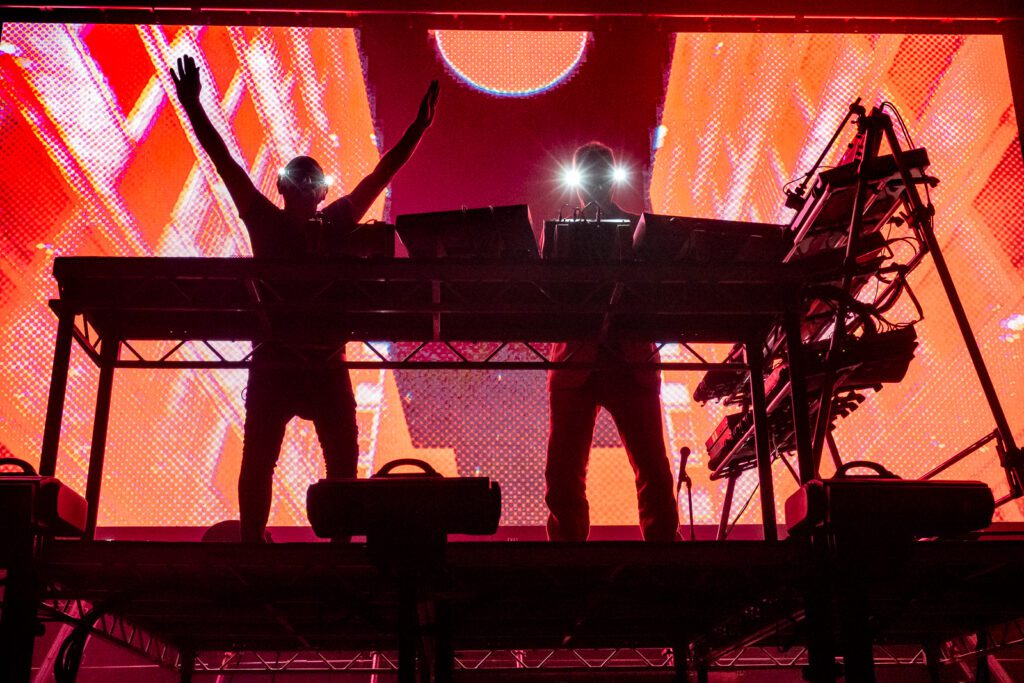WRITTEN BY Harry Martin | December 18, 2023

In the vibrant landscape of electronic music, few names carry the weight of innovation and influence quite like Orbital.
Formed in 1989 by brothers Phil and Paul Hartnoll from Otford, Kent, this English duo has left an indelible mark on the electronic music scene, blending genres seamlessly and crafting sonic landscapes that have stood the test of time.
Before you book your ticket to Orbital: The Green and Brown Album, let’s take a look at where this iconic duo started, and how they made their name.
The Early Years
The inspiration for the band’s name comes from Greater London’s orbital motorway, the M25, which played a central role in the formative years of the rave scene and the emergence of acid house. They recorded their first single, “Chime,” using nothing more than their dad’s 4-track tape deck.
With a production cost of less than £1, the track emerged from the band’s “under the stairs” home studio in Sevenoaks, Kent. Paul Hartnoll, one half of the duo, vividly recalled recording the track before heading to the pub, where he played the cassette for pirate DJ Jazzy M.
With a length of 12 minutes and 40 seconds, “Chime” became an underground sensation, and quickly sold out its original pressing on Jazzy M’s Oh’Zone records.
The success prompted record labels to vie for its release, and ultimately, Pete Tong’s FFRR record label secured the rights. An edited version was crafted in a professional studio, condensing the essence of the original 12-inch version to 3 minutes and 14 seconds. The track’s official release in 1990 propelled it to number 17 on the UK Singles Chart.
Orbital’s appearance on BBC TV’s Top of the Pops in March 1990 marked a significant moment as they performed “Chime” live, clad in Anti-Poll Tax T-shirts. Despite the producers’ insistence on miming, the band’s reluctance and apparent disinterest led to a six-year hiatus from the show.
Nevertheless, “Chime” remained a pivotal track for Orbital, acting as their introduction to a mainstream audience and solidifying its place as their fifth highest-charting single.
Orbital: The Green Album
Orbital’s inaugural studio album, commonly referred to as the Green Album, saw its release on September 30, 1991, courtesy of FFRR Records.
Recognised as a cornerstone in the techno genre, this album boasts timeless tracks, including the iconic “Chime,” “Midnight,” and “Belfast.” With a runtime of 76 minutes and 47 seconds, the album is a substantial exploration of Orbital’s pioneering sound, featuring live renditions of “Chime” and “Midnight.”
Notably, the album experienced a unique release in the United States, characterised by an altered cover and track listing that incorporated remixes and non-album singles, adding an extra layer of diversity to Orbital’s ground-breaking debut.
The Brown Album and Breakthrough
Known as ‘The Brown Album’, ‘Orbital 2’ or simply ‘Orbital’, this self-titled release marked their second studio album.
Boasting a diverse sonic palette, the album incorporates a blend of techno, ambient, and breakbeat tracks, including standout pieces like “Lush,” “Impact,” and the renowned “Halcyon + On + On.” The album garnered critical acclaim for its innovative soundscapes and musical experimentation, achieving a notable position by reaching number 28 on the UK Albums Chart.
This album showcased the duo’s ability to craft complex arrangements and textures. Notable tracks like “Time Becomes” demonstrated their innovative approach, using slightly delayed, looped samples from the TV show, Star Trek: The Next Generation.
The album also featured their masterpiece, “Halcyon and On and On,” incorporating Kirsty Hawkshaw’s vocals from “It’s a Fine Day.”
Go give it a listen, you won’t regret it.
Exploration and Experimentation
Orbital’s discography is a testament to their willingness to explore diverse styles and genres. Albums like Snivilisation (1994), In Sides (1996), The Middle of Nowhere (1999), The Altogether (2001), and Blue Album (2004) showcased their versatility and ability to evolve while maintaining a distinctive sound.
What sets Orbital apart is not only their musical ingenuity, but also their forays into the realm of cinematic soundscapes. Their contributions to film soundtracks, most notably in Event Horizon (1997) and The Saint (1997), showcase their ability to transcend the conventional boundaries of the music scene.
In these cinematic ventures, Orbital’s distinctive sonic signatures add depth and dimension to the visual narrative, underlining their capacity to create immersive auditory experiences that resonate far beyond the traditional confines of the music industry.
Through this, Orbital not only solidified their status as electronic music pioneers, but also as influential artists with a profound impact on sound and cinema.
Breaks, Reunions, and a Legacy
The year 2004 marked a temporary hiatus for Orbital, but they reunited in 2009 for a series of live shows and festivals. This pattern of separation and reunion continued, with the release of Wonky (2012) and Monsters Exist (2018).
Despite a brief split in 2019, the duo surprised fans with their return in 2020, releasing a new album, Optical Delusion, in 2023. Celebrating their 30th anniversary, they also treated fans to a 4 x Vinyl Boxset/Cd/Digital download featuring remixes and reworks of their classic tracks.
Orbital: The Green and Brown Album – Don’t Miss Out
Orbital’s impact on electronic music is immeasurable. Their live improvisation and visually stunning performances have earned them acclaim from peers and critics alike.
Artists such as Jon Hopkins, Logic 1000, and The Chemical Brothers have praised their work, recognising Orbital’s role in shaping the electronic music landscape.
Join us on a sonic journey through the realms of techno, ambient, and breakbeat as Orbital takes the stage at The Great Hall, bringing to life the classics that catapulted them to stardom.
Don’t miss this once in a lifetime opportunity, book your Orbital: The Green and Brown Album ticket, here!
OUR VENUES





